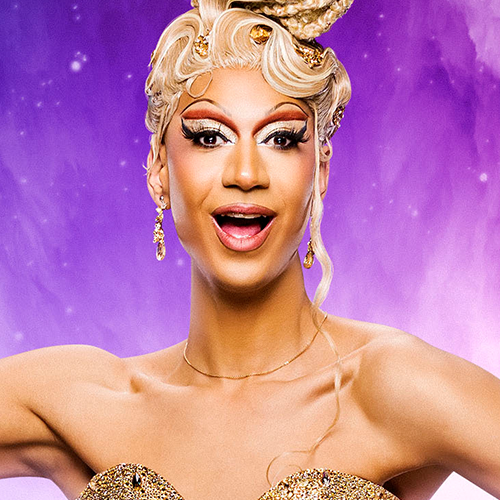Doctor Who: Five LGBTQ+ people share what the show means to them
In honour of the return of Doctor Who, here’s what the show's past, present, and future has meant to members of the LGBTQ+ community

Last weekend, Doctor Who, the longest-running science fiction series in the world, returned to our screens. Billed as a soft relaunch and helmed by returning showrunner (and screenwriting legend) Russell T Davies, the opening double-fister was as thrilling as ever. This new series holds many firsts including being the first to drop internationally on streaming giant Disney+. It’s also the first in the show’s (nearly) 61 years to star an openly queer actor as the time-traveling Time Lord, played by the electric Ncuti Gatwa.
Gatwa, 31, materialised onto our screens as the Fifteenth Doctor in November 2023 but Whovians have been eagerly awaiting the actor’s first full season alongside new companion Ruby Sunday (Millie Gibson). Despite being the first openly queer actor in the role, Doctor Who has a solid history of LGBTQ+ representation and a fan base that mirrors this. Even way back in the 1970s, Third Doctor (Jon Pertwee) and assistant Jo Grant (Katy Manning) were discussing pronouns, while in the final story of the 1989 series, companion Ace (Sophie Aldred) shared a hinted-at lesbian fling with a Cheetah person.
Then, when the series was first revived by Davies back in 2005, the floodgates of representation truly opened. For many, the renewed series was a pivotal moment in seeing LGBTQ+ identities reflected back at them in a mainstream family series. The new era ushered in returning queer characters like Captain Jack Harkness (John Barrowman), Bill Potts (Pearl Mackie) and Yaz Khan (Mandip Gill). Last Christmas, we were introduced to a new series regular – Rose Noble played by Heartstopper’s Yasmin Finney. The character’s transness was proudly put front and centre, with her introductory episode addressing the harsh reality of being trans in 2024.
In honour of the return of the Timeless Child, here’s what Doctor Who’s past, present, and future has meant to members of the LGBTQ+ community…
Juno Dawson, Author – @junodawson

Some of my earliest memories are of Doctor Who. I remember, with nightmarish clarity, the scene where Peri (Nicola Bryant) is transformed into a bird woman by a mad scientist. Also, I remember having to wait a week to discover if Mel (Bonnie Langford) would explode in the evil Rani’s spinning bubble of death. I was a little older when I evolved into a true Who stan. My grandma used to babysit for us on a Friday night and, during the 90s, some older episodes were repeated on BBC2. My grandma introduced me to Jon Pertwee and Tom Baker, Sea Devils and Daleks, and, somehow, Doctor Who became central to my identity. I was THAT WEIRD DOCTOR WHO KID. I guess it was marginally better than ‘hahahaha Dawson runs like a girl’.
Looking back, I don’t think it’s hard to see why a queer adolescent would be so obsessed with Doctor Who. For one thing, the Doctor is kind, honourable, and always on the side of the underdog. They champion social justice and fairness above all else. He (or later she) wasn’t the musclebound lump so prevalent in 80s or 90s media; the Doctor got out of scrapes with their intellect and wit, something that felt within my grasp as a massive nerd. Moreover, the Doctor would arrive in the humdrum life of some unsuspecting human girl and whisk her away from the drudgery of her day-to-day. I too wished someone would come and take me away from the difficulties I was having at school.
60 years after it started on the BBC, I still think Doctor Who is the best idea ever. A genius alien in a time machine fights injustice with his human friend. Bonkers, brilliant, and so very British.
Tia Kofi, Performer & Host of The Final Frontia podcast – @tiakofi

I first became a Doctor Who fan back in 2005 when it relaunched with Russell T Davies. I was instantly obsessed. What Russell did particularly well was making the Doctor a very lonely person who was trying to find their way home – something I think a lot of young queer people can identify with. That feeling of being a fish out of water and not having that sense of belonging, but they’re always able to find a companion, which is lovely.
For me, the best representation of a queer character was Pearl Mackie as Bill. Her sexuality was just present. It wasn’t a big revelation, but it was, in the end, very relevant to her journey. It wasn’t like they were going, “We’ve got a lesbian!” Her sexuality was something that was just a part of her and, in the end, her relationship with Heather saved her. Also, seeing queer people of colour is even less common than seeing a non-POC queer person.
LGBTQ+ representation in Doctor Who is important because it exposes its audience to different types of people. I mean, the show is literally about a person with two hearts and the ability to regenerate every cell in their body from a different planet. If people can cope with weird robots but take issue with queer representation – that’s ludicrous. Being able to expose audiences to LGBTQ+ people in a show that is so iconic, and so familiar with the British public, is super important. It teaches them that other people exist, and that’s so nice.
And Russell, if you want to put me in the show at any point, I’ve got ideas for characters and plot lines already in my head. I’m not saying I need to be in drag. I also act out of drag. Whatever you need. A regenerated Maestro, perhaps? Or I can just be a brown boy from South London. That’s also fine.
Reece Connolly, Host & Co-Producer of The Gallifrey Cabaret – @reece_connolly_ / @gallifreycabaret

Doctor Who has been a powerful current running throughout my life, since that night in 2005 when I was 11, sitting on the end of my bed watching ‘Rose’ on a chunky old telly. I was instantly transfixed. “Nice to meet you, run for your life!” – I’ve been running with The Doctor ever since.
It’s provided comfort and escapism and inspiration; growing up queer and shy in a working-class North East community, it opened a window onto an infinite cosmos of glorious possibilities.
Here is a show revolving around a true rebel who lives by their own rules, defies authority, and takes so much strength from the incredible people and personalities they surround themselves with. A gender-fluid, sexually-liberated, fashion-forward, courageous, eccentric, endlessly curious and compassionate outsider – what’s not to love! Someone who is fiercely loyal to their chosen family and friends. Who lives for freedom and self-expression. That’s pretty gay, and it’s completely wonderful.
I can’t wait to see where the Whoniverse takes us next. We have the breathtakingly talented Ncuti Gatwa in the title role (has anyone become THE DOCTOR so instantly?!) And alongside this: RTD’s return as showrunner! Millie Gibson! Jinkx Monsoon! Bonnie Langford! Yasmin Finney! Shocks and surprises! Giant space-slugs! Brand new fans! So many moments that will keep the fandom discussing (and arguing teehee) for eons to come! My screwdriver is sonic-ing at the thought.
Through Doctor Who I’ve made some amazing friends; it was one of the first things myself and my partner bonded over; it’s the inspiration behind this mad, silly cabaret show we both produce and perform in. And on top of all this, it’s taught me so, so much: be true to yourself, stay curious, keep fighting, and run towards adventure at full speed.
It’s a great motto to live by: What Would The Doctor Do?
Sam Player, Co-Host of Wholala podcast – @samwhotried / @wholalapod

Doctor Who has always had strong ties to the queer community, but I don’t think it was until recently that I realised just how much my connection to the show was linked to its queer history. I vividly remember watching Captain Jack kiss both Rose and the Doctor as he said goodbye to them on Satellite Five, and how it was the first time I’d ever seen two men kiss. Not long after that, I was walking around the playground asking anyone I could find, “What does gay mean?”, to which I was told, “It just means you’re happy”.
As a queer person, I feel that, much like the Doctor, I’ve been regenerating throughout my life; changing as I grow and finding more out about myself along the way. When the Doctor regenerates they quite literally change into an entirely new person, but the essence of the character is always there underneath. I think that this is probably relatable to a lot of queer people, with so many events in our lives pushing us closer to change; from coming out, finding our first crush, meeting our chosen family, and haphazardly bleaching our hair with a box kit. We all face difficult times that stay with us, but much like that Time Lord from Gallifrey, we take those experiences and use them to propel us toward new friends, new places, and a whole universe of queer joy.
From Ncuti Gatwa’s casting as the first openly queer actor to play the Doctor, to David Tennant’s vocal support behind the trans community, I’ve never felt more connected to the show that I’ve loved since childhood. Doctor Who has always been about celebrating those who feel different, and I hope that the upcoming era inspires and connects a new generation of young LGBTQ+ viewers, as it did to me all those years ago.
Joseph Ryan-Hicks, Producer & Writer – @josephryanhicks

One of my earliest memories of seeing a gay man on telly was watching the traumatic coming out of Corrie’s Todd Grimshaw back in 2004. As a young child, I watched as homosexuality was depicted as controversial and the ripples of one’s coming out as devastating. The young Todd (Bruno Langley) was described as a pervert with AIDS and made to feel ashamed, embarrassed, and guilty.
Little over 12 months later, the regenerated version of Doctor Who was in full swing with a prominent gay writer steering the ship. Suddenly, being gay wasn’t ‘wrong’. Being gay was merely a trait, an inconsequential thing that might be addressed in a line of dialogue and then quickly breezed over. Gay characters also looked to be having fun. They weren’t cowering in the shadows or wallowing in despair. They were people like Captain Jack Harkness. Vibrant and funny. The Doctor, then played by Christopher Eccleston, appeared to enjoy the companionship of Jack and would play along with his flirty banter. The pair even shared a kiss, with Eccleston’s Doctor unphased by the intimacy.
Watching this was revelatory to me as someone who had only been familiar with the macho leads of James Bond and Indiana Jones. Oh, and there was Billie Piper, a former pop star. My little gay brain couldn’t handle the fabulousness.
Upon seeing the rebooted first series, my adoration for Who only grew. I stepped back in time, discovering the classics on UK Gold. From Jon Pertwee’s camp-as-tits wardrobe to Adric, the original twink in the TARDIS, we’ve always been there, in some way. Whether you choose to accept it or not, Doctor Who has always been pretty gay. And at the same time, it has always been a show for everyone. Long may the Doctor’s bonkers, wonderful adventures continue.
